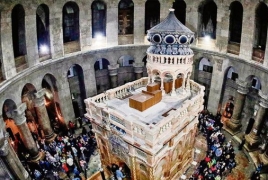
Christian leaders in Jerusalem closed the Church of the Holy Sepulchre -- built where tradition holds Jesus was crucified, buried, and resurrected -- in protest against an Israeli plan to tax their commercial properties, RFE/RL reports.
In a joint statement on Sunday, February 25, the leaders who share responsibility for the site assailed what they called a "systematic campaign of abuse" against them and an unprecedented attack on Christians in the Holy Land.
"As a measure of protest, we decided to take this unprecedented step of closure of the Church of the Holy Sepulchre," Greek Orthodox, Armenian Apostolic, and Roman Catholic leaders said in a statement read out in front of the church.
"This abhorrent [tax] bill...if approved, would make the expropriation of the lands of churches possible," said the statement by Theophilos III, the patriarch of Jerusalem; Francesco Patton, the custos of the Holy Land; and Nourhan Manougian, the Armenian patriarch of Jerusalem.
They did not indicate how long they planned to keep the site closed. The church is one of the most popular locations for visitors to the Holy Land. The cave where Christians believe Jesus was buried and the traditional site of his crucifixion are both located on the property.
After the protest by the Christian leaders, an Israeli cabinet committee said it had delayed its scheduled consideration of the tax bill so that "we could work with the churches" to try to resolve the dispute.
The Christian leaders have been angered over attempts by Israeli authorities in Jerusalem to enforce tax collection on church property they consider commercial, with exemptions applying only to places of worship or religious instruction.
Jerusalem Mayor Nir Barkat said the city was owed 650 million shekels ($186 million) in uncollected taxes on church properties.
Barkat stressed that the Church of the Holy Sepulchre and all others would continue to be exempt from the taxes and that the changes only affect sites such as "hotels, halls, and businesses" owned by the churches.
"These are not houses of worship," the Jerusalem municipality said. "We will no longer require Jerusalem's residents to bear the burden of these huge sums."
Christian leaders say the action would jeopardize their ability to do their work which, along with religious duties, also involves related social-service activities.

